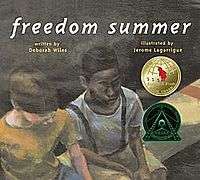Freedom Summer (book)
Freedom Summer is a children's book written by Deborah Wiles and illustrated by Jerome Lagarrigue. Originally published as a hardcover edition in 2001, the book is now available as a paperback from Simon & Schuster.
 | |
| Author | Deborah Wiles |
|---|---|
| Illustrator | Jerome Lagarrigue |
| Language | English |
| Genre | Children's literature |
| Publisher | Simon & Schuster |
Publication date | 2001 |
| Pages | 32 pages |
| ISBN | 978-0-689-87829-9 |
| OCLC | 57510775 |
Plot
The novel is set in Mississippi during the summer of 1964, a summer of desegregation in the South. The story revolves around two best friends, John Henry, who is black and Joe, who is white. They do everything together, including swimming in a local creek. However, they cannot do the same in the town pool because blacks are not allowed to use the public swimming pool.
Joe is then told that a law has been passed that blacks can do everything that whites can do. He is really excited because this means that he can go to the town pool tomorrow with John Henry. The boys are more excited than ever but when they arrive at the town pool the following day, they are shocked to find that the town pool has been closed. The pool has been filled with black sticky tar as the white people in their community chose to close down the entire pool instead of facing the prospect of sharing it with their black neighbors. While the laws of the nation of changed, it becomes clear to the boys that attitudes and ideas about race will take longer to evolve.
The boys are disappointed but the book ends with a glimmer of hope as the two friends are able to enter a grocery store together that was previously for whites only.
Awards
Illustrator Jerome Lagarrigue won the John Steptoe Award for New Talent[1] for this book. In 2002 the book won the Ezra Jack Keats Award[2] for best new picture book writer of the year and best new illustrator.
See also
References
- List of John Steptoe Award for New Talent winners "
- List of Ezra Jack Keats Award winners "Archived copy". Archived from the original on 2008-06-22. Retrieved 2008-06-29.CS1 maint: archived copy as title (link)"